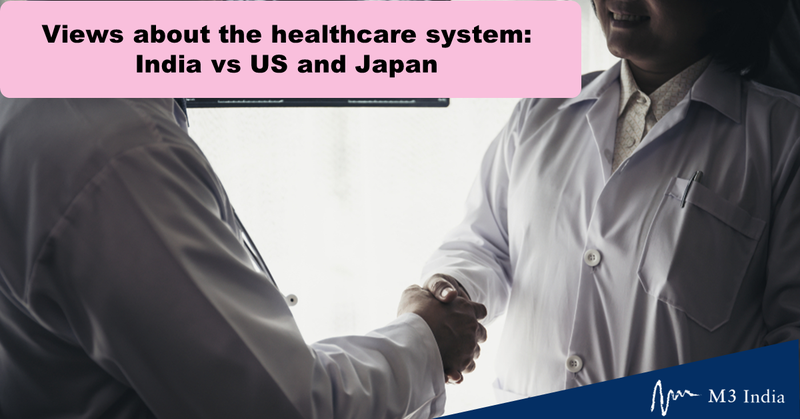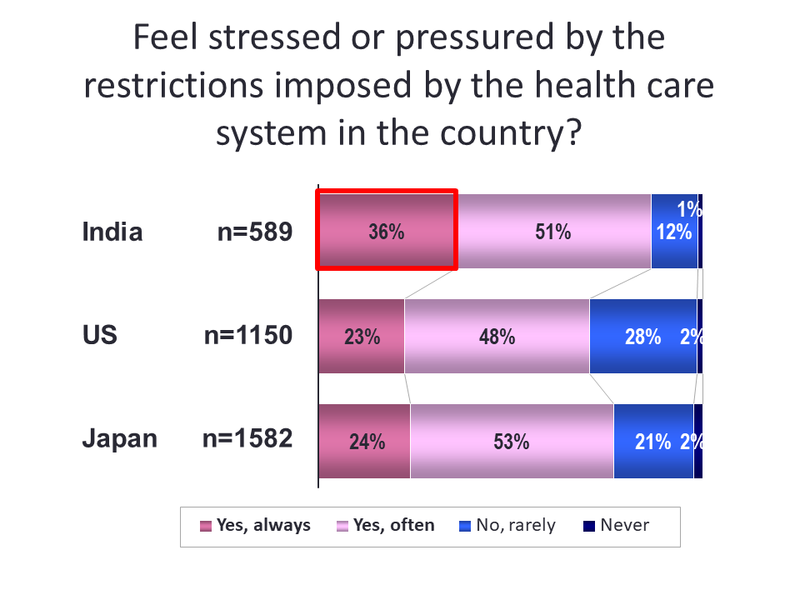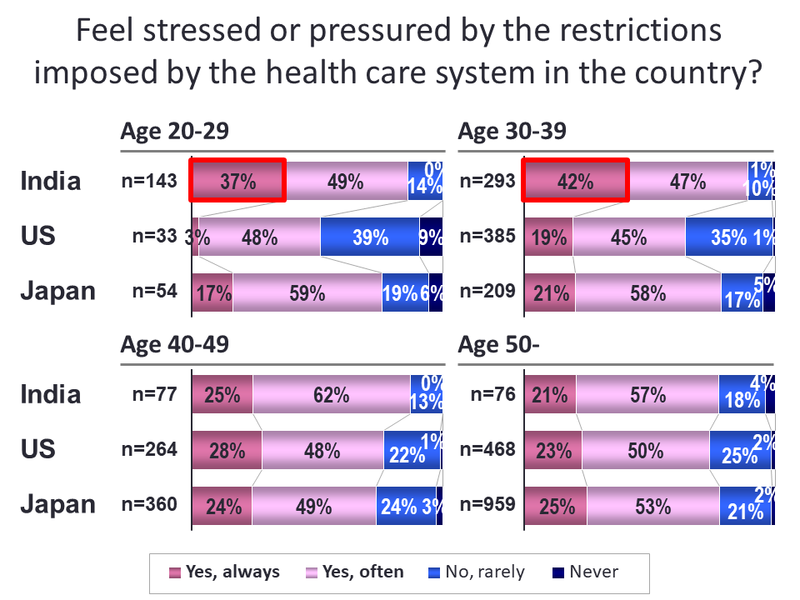Frustration about the healthcare system looms large among doctors in India, US, and Japan (M3 India survey)
M3 India Newsdesk Jul 10, 2018

The Hippocratic oath requires a doctor to treat the ill to the best of his ability, to preserve a patient’s privacy, and to pass on the secrets of medicine to the next generation. Sadly, adhering to these is becoming harder with the prevailing healthcare systems in most countries. M3 India’s survey tried to understand why doctors in India, US, and Japan seem to be frustrated with the healthcare system.

Part 7 of the survey results bring up some current, pressing issues.
Stress and pressure caused by the healthcare system*
36% Indian doctors continuously feel very stressed and pressured by the current healthcare system of our nation. This percentage was slightly lower among US (23%) and Japanese (24%) doctors.

Most doctors feel the healthcare systems in their respective countries to be skewed and this is the common reason for stress and pressure. The numbers are high especially in India, where 87% doctors almost always feel pressured by the system. These numbers seem to be slightly lower for US (71%) and Japanese (77%) doctors, but nevertheless high. So, it is a general consensus that doctors in all three countries feel pressured by the current healthcare system in their respective countries.
Comparison of pressure caused by the healthcare system across different age groups*
37% Indian doctors between the ages of 20 and 29 and 42% between ages 30 and 39 feel continuously pressured by the healthcare system. Percentages among the same age groups are low in the US and Japan.

Younger Indian doctors who are just starting out in their career have mentioned feeling extremely stressed and pressured by the system. The percentages somewhat slightly reduce as they grow older and advance in their careers. In the US and Japan, doctors in the age groups of 40 to 49 and 50 to 59 feel more stressed by the system.
What do you think is the main challenge facing the architects of healthcare policy in India?
Most Indian participants of the survey have mentioned that the policy makers have a very poor understanding of the healthcare needs in the country. Doctors have a clearer picture of this because they deal with the system on a first-hand basis. They know the gaps and are aware of the areas that need major revamping and improvement.
In India, doctors feel pressured because they are continuously forced to deliver quality healthcare despite the lack of basic infrastructure and the extremely poor conditions that prevail in government hospitals. Inequality still exists when it comes to accessing healthcare, and because of poor budgeting, there is stark difference in the quality and cost of treatment between government and private hospitals too.
A few other comments from Indian doctors are mentioned below:
"Budget allocated to health care is far less than it should be. Conditions of government-run hospitals is horrible and lack basic amenities. PHCs run by government have poor infrastructure. Lack of adequate specialists."
"Doctors are not involved in policy making. Current policy makers don’t care about quality of medical treatment."
"More budget should be allocated to government-owned healthcare institutions. We need to have good infrastructure and medicine supply in government hospitals. Medical insurance should be mandatory."
"There is a lack of vision about how the system should be to deliver affordable quality healthcare."
What do you think is the main challenge facing the architects of healthcare policy in US?
In the US, more doctors between the ages of 40 to 49 (28%) and 50 to 59 (23%), seemed to feel extremely pressured by the healthcare system when compared to Indian doctors. Apart from the similar comment about politicians and policymakers not being aware of what the public health system needs, US doctors also feel that insurance and pharmaceutical companies exercise too much control over the healthcare system.
A few other comments from US doctors are mentioned below:
"Politicians don't really understand what the problems are with the soaring cost of medical care. They need to step away and involve people in the health care industries, physicians in particular and people very savvy in solving problems, such as people in the tech industries."
"The solutions are- removing the control and influence of insurance companies who are interested more in preservation of revenues than provision of care; creating an system that provides reasonable cost controls without restricting physicians ability to manage care of patients; reducing administrative burden."
"Keeping reimbursement for physicians as high as possible in order to attract the best talent. I do not feel that we are putting our best students into medical school at this time because it is not as appealing financially as some other professions."
What do you think is the main challenge facing the architects of healthcare policy in Japan?
Similar views of the healthcare system in Japan persisted among all doctors, in all age groups, participating in the survey. In Japan, most doctors felt the problem lies with the universal health coverage for the citizens of the country, which means everyone is covered by public healthcare. Unfortunately, for doctors, this means that, since the cost burden on the patient is low, patients often visit hospitals even for small illnesses.
This can spell trouble for the system, especially since the number of elderly people are continuing to increase, doctors are always busy treating patients through the day, that they don’t have much time to spare for improving doctor-patient relationships and communication.
A few other comments from Japanese doctors are mentioned below:
"Because the patient's cost burden is too low, it becomes mandatory to see patients with mild illness. It is in a state of "low interest rate sale". With the current situation of the number of elderly people continuing to increase, the number of doctors will be in short even if we have a lot of doctors."
"Medical practices tend to be accompanied with reasonable risk. Law should have a thought of exemption from responsibility for medical practices above a certain level of difficulty."
"Current public insurance system in Japan guarantees medical treatment beyond necessity. It is too much to cover up to the highest level of medical care with public medical insurance. Advanced medicine and high medical care should be covered by private insurance."
Key findings
Some of the key findings gathered from this part of the survey are:
- Indian doctors seem to feel most pressured by the healthcare system in the country, especially those between the ages of 20 and 39. This pressure and stress could stem from bad healthcare budgeting, poor policies, violence faced by doctors and the lack of support offered, and poor infrastructure in the country.
- One common reason for frustration that was present among doctors in all three countries was the growing concern that doctors have very little say when it comes to policy making. It is mostly left in the hands of people, who don’t seem to have much knowledge about what the system, doctors, and patients need. Doctors feel that they should play a bigger role in policy making.
To read part 1 of the survey, which discusses about work days and work hours for doctors in India, US, and Japan, click here.
To read part 2 of the survey which discusses doctor workload among doctors in India, US, and Japan, click here.
To read part 3 of the survey which discusses professional satisfaction among doctors in India, US, and Japan, click here.
To read part 4 of the survey which discusses about when doctors in India, US, and Japan decide on their career and if they would recommend their professions, click here.
To read part 5 of the survey which investigates how easy or difficult it is for doctors to avail childcare leave in India, US, and Japan, click here.
To read part 6 of the survey which investigates work-life balance of doctors in India, US, and Japan, click here.
To read part 8 of the survey which reveals the country that ranks best across various parameters like healthcare system, quality of medical care, work environment, salary, and basic medical reasearch, click here.
*This data should be read as indicative of rather than exact figures.
-
Exclusive Write-ups & Webinars by KOLs
-
Daily Quiz by specialty
-
Paid Market Research Surveys
-
Case discussions, News & Journals' summaries